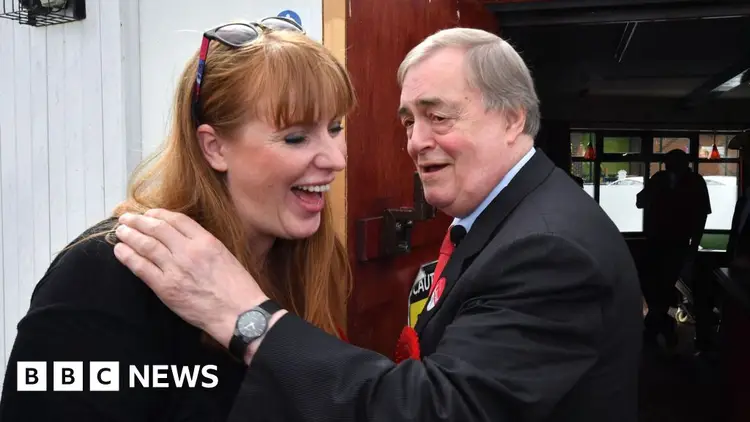How John Prescott blazed a trail for Angela Rayner

John Prescott, who passed away at the age of 86, was a prominent leader in New Labour, though he often had a natural skepticism towards certain aspects of its philosophy.
He served as a connection to the Labour Party's foundational working-class background, recognizing the importance of supporting the hopes and dreams of those who are less fortunate, and he truly embodied that commitment.
Tony Blair saw great value in him during the landslide victory in 1997, and as they went on to win two more elections together, Prescott played a crucial role in calming and guiding those in the Labour Party who were hesitant about its shift towards a more centrist position.
He also served as a unifying force, adept at keeping the party and its occasionally conflicting groups united.
It's easy to notice the similarities between the past and present, as we have another straightforward working-class individual from the north serving as deputy prime minister alongside a sophisticated lawyer from North London.
Angela Rayner's background and her style of engaging in politics share noticeable similarities with John Prescott, a connection that Rayner has openly recognized.
When discussing her approach to the role of deputy prime minister in 2022, she told LBC, "I'll be the female version of John Prescott; I speak my mind honestly."
She mentioned, "John and I are really good friends; we hang out often, and I definitely look better when I wear a skirt."
In a statement to the media following the announcement of his passing, Rayner expressed how much support he had received from him since he entered the political arena. He highlighted the guidance he offered, which was to "stay true to yourself and always consider the individuals you're meant to serve."
She mentioned, "He used to tell me all the time, 'You've got a voice, kid; make sure to use it.'"
Both of them graduated with limited qualifications and climbed the ranks within the labor movement before making their way into politics.
Both were able to express the genuine feelings of the Labour party's core supporters, using the language and tone that those supporters typically prefer.
Prescott occasionally employed a rather unorthodox approach to win over voters. In one notable instance, this even escalated to him physically striking one of them.
In the 2020s, as the revamped Labour Party aimed to regain its appeal by trying to attract former Conservative voters, it was Rayner who referred to some Conservative ministers as “a bunch of scum,” a comment for which she later expressed regret.
The cliché that all politicians appear and behave similarly definitely doesn't hold true for Prescott or Rayner.
Social class is an important lens for examining Prescott's career, political views, and life experiences.
Despite all the discussions about him representing the genuine working-class spirit within the refined, polished atmosphere of New Labour, his perception of his social background—what he referred to as "bottom class"—played a significant role in how he viewed himself and the people around him.
If you have a little time today, I suggest tuning into an excellent documentary on BBC Sounds called "Prescott At Your Service." It shares the story of a 19-year-old John Prescott who worked as a waiter on a cruise ship heading to New Zealand, where he had the opportunity to serve Anthony Eden, the former prime minister who had just stepped down from office.
Years later, Tony Blair would note that Prescott's perception of himself was a constant factor in his everyday dealings within the government.
He had a knack for detecting condescension, insults, or any hint of arrogance from far away. The moment he sensed it, he would pursue it with surprising enthusiasm.
John Prescott bridged the gap between the historical roots of the Labour Party and its current state.
He also played a crucial role in connecting Tony Blair and Gordon Brown, whose essential yet often troubled partnership shaped the Labour government's first ten years in power from 1997 to 2010.
He demonstrated a way for individuals from less common backgrounds to reach the highest levels of influence in British politics, which is usually dominated by those from more privileged origins.
Subscribe to our Politics Essential newsletter to access leading political commentary, get insights from around the UK, and keep up with significant events. You'll receive it directly in your inbox every weekday.

















































